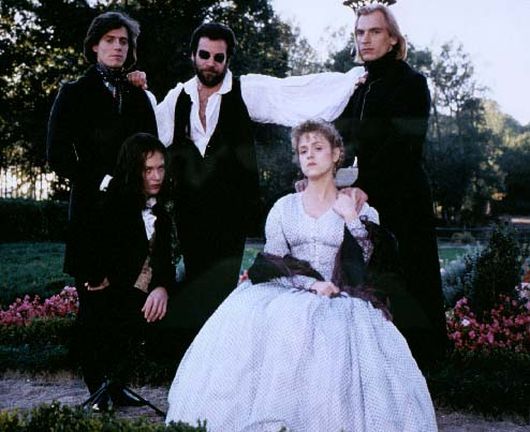 MUSIC
MUSIC In Which Chopin and George Sand Briefly Thrill Each Other
 Wednesday, May 22, 2013 at 11:05AM
Wednesday, May 22, 2013 at 11:05AM 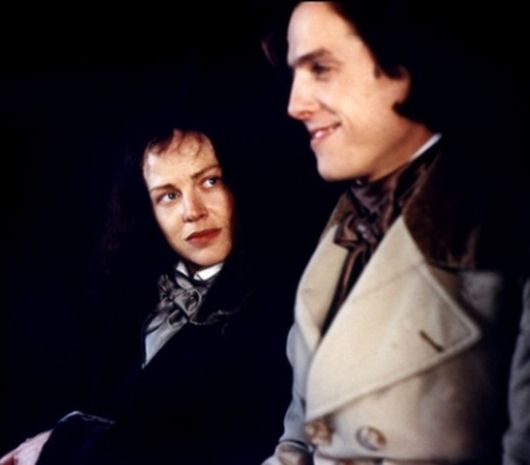
A Seduction
by CATHALEEN CHEN
Frédéric Chopin and George Sand met in a Parisian salon, where Chopin dueted with his musical contemporary and uncredited wingman, Franz Liszt, while Sand smoked a cigar. It’s rumored that as Chopin played the ivory keys with his frail, ivory fingers, Sand stood beside him, enthralled. When he finished, she leaned down and kissed him on the mouth without saying a word.
For ten years, they were a celebrity couple of turn-of-the-century pre-Victorian Paris, among the intellectual circle of Liszt and Eugene Delacroix. They epitomized romance of the Romantic era — passionate, tumultuous and hauntingly sad, much like the melody of a Chopin Mazurka.
Two years after their last, but only, breakup, Chopin died before he could turn 40. They say it was heartbreak, exacerbating a life-long battle with tuberculosis. But his life had always been tarnished by sickness and deep emotionality, which — on a morose and incidental level — guaranteed perpetual inspiration.
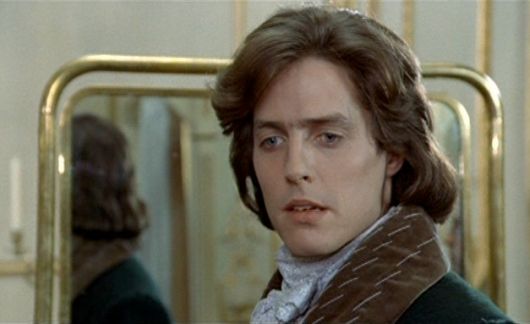
Born into an aristocratic family in Warsaw in 1810, Chopin was hailed as a prodigy by age 7. It was his older sister Ludwika who taught his first piano lesson and his younger sister Emilia whose death at 14 invoked his penchant for dark, ambivalent refrains. Their father died of the same disease in 1844.
He was an expatriate, living in Paris for the last 18 years of his short virtuoso life, though it was Poland that eventually adopted his Military Polonaise as a sort of unofficial Polish anthem. A reticent and delicate man, Chopin was an obsessive artist with a chronic cough, a dubious match for the fiery Sand.
Six years before Chopin, George Sand was born Amandine Aurore Lucille Dupin. Her family had distant relations to Louis XVI and Louis XVIII. By the time she met Chopin, she already harbored the reputation as the most notorious woman in Europe.
She was a Marxist and a cross-dresser, a raging feminist by today’s standards. It was at the height of her literary career when she permanently adopted a male pseudonym. Chopin, sickly and conservative, could never call her by a name as masculine as George, instead opting for the softer Aurore. When they met, Sand was already a devoted mother of two, a political activist and a lusty man-eater — mostly of younger men. Biographers would later characterize Sand as the manipulative seductress of Chopin. But he, the same sickly, wishy-washy 27-year-old musical poet, indeed became the love of her life. And it’s true that he didn’t always reciprocate those feelings. It was Sand who had asked Liszt to set up their meeting, while Chopin initially dreaded the “repellant woman,” as he had written to a friend. “Is she really a woman? I am inclined to doubt it,” he continued.
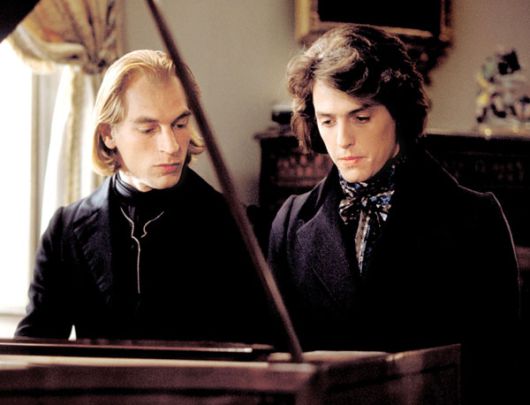
At the time, Chopin was involved with the Polish Maria Wodzínska. Well-groomed and presumably very vanilla, Wodzínska was engaged to the pianist until their matrimonial plans somehow fell through. In sensible and convenient timing, Sand swooped in and swept him away.
According to Liszt’s lofty biography of Chopin, the composer put off meeting Sand until he possibly couldn’t. On their first encounter in that dimly lit salon, Sand won him over as easily as history dictates. Both being patrons of art, Chopin was impressed by Sand’s capacity for music — namely, his music.
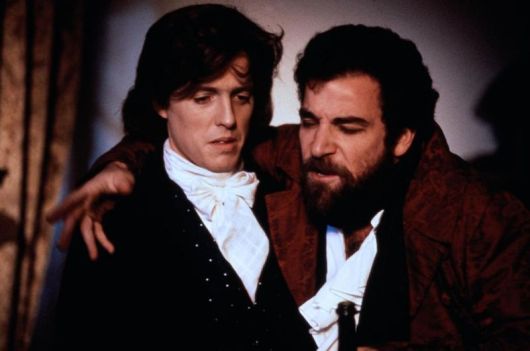
By the summer of 1838, they were in an amorous and often scandalized love affair. He would play her his new pieces as she nurtured his precarious health. Not to mention, she introduced a new sexual energy in his life. In the following winter, the two embarked on a vacation to Majorca, a Mediterranean island off the eastern coast of Spain. It turned out to be the most troublesome vacation ever, as Chopin fell deathly sick amidst an unaccommodating local culture. The weather was colder than expected, and at one point, the couple, along with Sand’s two children, was evicted after the landlord discovered Chopin’s symptoms of consumption.

For months, Sand cared for the feeble Chopin. She would cook and clean during the day, and write well into the night. When he finally recovered, they returned to Sand’s home in Nohant, where they would spend every summer until 1842.
In Nohant, a quaint town in Central France, they entertained guests and worked on their respective repertoires. It was there that Chopin composed some of his best work, including his B minor Sonata, the Op. 55 Nocturnes and the Op. 56 Mazurkas. As his health continued to fail, their relationship eventually became mostly platonic. A testament to her devotion, Sand — despite her history of intense sexuality and a track record of casual hookups — stayed with Chopin.

But the relationship suffered as Sand grew impatient with Chopin’s ailing health and temperaments. Aggravated by financial pressures and Sand’s now-mature and manipulative daughter Solange, their tensions prevailed. Sand wrote in a letter, “Chopin is the most inconstant of men. There is nothing permanent about him but his cough.” Even worse, in her 1846 novel Lucrezia Floriani, Sand created a male character as an obvious foil of Chopin, but embodying only his despicable attributes: temperamental, jealous and at times, cruel. They had their last fight in 1847, resulting in permanent estrangement. It was a social ordeal, and between polarized friends and an utter lack of closure, they both convinced themselves that neither loved each other anymore.
Chopin held his last recital the following year in Paris, and in the summer of 1849, he fell too sick to compose. In perpetual bed rest, Chopin asked his stream of visitors about Sand, while she did exactly the same in a letter to his sister Ludwika, who refused to answer. He died that September, with Ludwika at his side. Sand did not attend the funeral, and his heart and belongings was taken back to Poland. Among his items was a lock of hair in an enveloped embroidered with “G.F.” — George/ Frédéric.
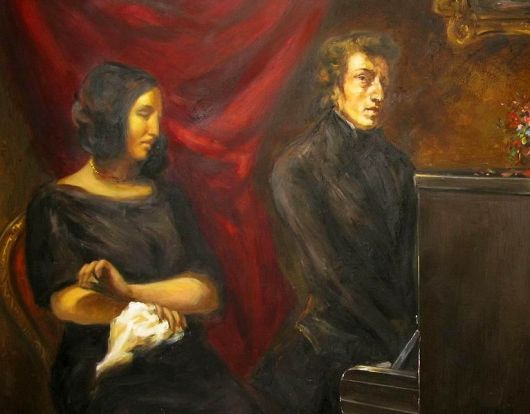
Years before their split, Delacroix had begun a portrait of the young couple. The painting remained unfinished in Delacroix’s studio until his death in 1863, when, for some godforsaken reason, it was cut in half and sold as individual portraits of Sand and Chopin, two great — but separately regarded — romantics. One half is a headshot of Chopin, in which he looks into the distance. Sand’s other half shows her upper body with her head turned down to her left. Her face is soft, unfocused and her mouth slightly agape, a strange pose for a 19th century portrait.
When put together, the two canvases depict a domestic scene in which Sand sits by Chopin’s side as he plays the piano. Like the first time they met, Sand is enthralled, captured as almost uncharacteristically feminine. But the portraits, split and cropped, are now separated by the 800 miles between the Louvre and Copenhagen’s Ordrupgaard Museum — perhaps forever out of context, a dissonance irrevocable by melody.
Cathaleen Chen is the senior contributor to This Recording. She is a writer living in Chicago. You can find her twitter here.

"Prelude Op. 28 No. 9 in E" - Chopin (mp3)
"Sonata Op. 35 No. 2 in B flat minor" - Chopin (mp3)
